Extension Professionals Enable Horse Play
go.ncsu.edu/readext?979999
en Español / em Português
El inglés es el idioma de control de esta página. En la medida en que haya algún conflicto entre la traducción al inglés y la traducción, el inglés prevalece.
Al hacer clic en el enlace de traducción se activa un servicio de traducción gratuito para convertir la página al español. Al igual que con cualquier traducción por Internet, la conversión no es sensible al contexto y puede que no traduzca el texto en su significado original. NC State Extension no garantiza la exactitud del texto traducido. Por favor, tenga en cuenta que algunas aplicaciones y/o servicios pueden no funcionar como se espera cuando se traducen.
Português
Inglês é o idioma de controle desta página. Na medida que haja algum conflito entre o texto original em Inglês e a tradução, o Inglês prevalece.
Ao clicar no link de tradução, um serviço gratuito de tradução será ativado para converter a página para o Português. Como em qualquer tradução pela internet, a conversão não é sensivel ao contexto e pode não ocorrer a tradução para o significado orginal. O serviço de Extensão da Carolina do Norte (NC State Extension) não garante a exatidão do texto traduzido. Por favor, observe que algumas funções ou serviços podem não funcionar como esperado após a tradução.
English
English is the controlling language of this page. To the extent there is any conflict between the English text and the translation, English controls.
Clicking on the translation link activates a free translation service to convert the page to Spanish. As with any Internet translation, the conversion is not context-sensitive and may not translate the text to its original meaning. NC State Extension does not guarantee the accuracy of the translated text. Please note that some applications and/or services may not function as expected when translated.
Collapse ▲Martha Mobley likes to joke that the annual horse farm tour organized by N.C. Cooperative Extension’s Franklin County center occurs on the hottest day of the year. The event, which brings together equine lovers and owners to share knowledge and make connections, takes place on the first Friday in August.
“We looked for the best time of year to have it,” said Mobley, NC State University’s Extension agriculture agent in Franklin County. “We decided on the hottest day of the year. That’s when people are finishing their vacations, getting ready to start back to school. It is a slower time for people so they’re ready to share a day.”
The horse tour is bookended by a clinic to test for equine infectious anemia (EIA) at a local farmers market in the dead of winter.
“We have that on a Saturday morning, normally the coldest Saturday, the coldest day of the year,” she said.
The dates are appropriate. The NC State Extension equine husbandry program exists to help horse owners on the hottest day, the coldest day, and every day in between. From horse farm tours in Franklin and other counties, to 4-H programs that introduce youth to the knowledge and care of horses, to statewide and county-specific pasture management and forage information, NC State Extension plays a vital role in an important industry.
“Horse owners are concerned about the care and the upkeep of their animals,” said Paul Siciliano, department Extension leader in animal science at NC State’s College of Agriculture and Life Sciences. “If they’ve got a nutrition question or a question about renovating a pasture or even developing a facility, they can call us and we can give them unbiased and objective information. A lot of times those questions are coming to us through a county agent. And the county agent can address a lot of questions because of their background and knowledge base.”
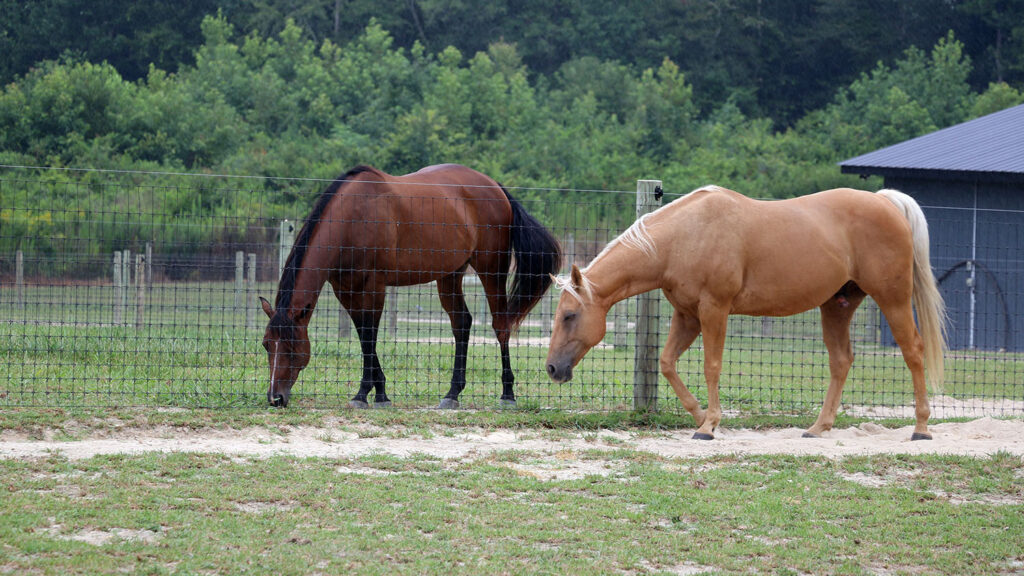
NC State Extension experts help horse owners manage their investment with advice on forage, fencing, and many other topics.
The equine industry has a $3.44 billion economic impact in North Carolina, according to the North Carolina Horse Council, including $1.1 billion in sales plus associated businesses.
“It shows up not just in the sale and the purchase of horses, but in all of our cottage industries that surround that — feed, tractors, trucks, trailers,” said Sue Gray, executive director of the N.C. Horse Council.
The state ranks in the top 10 nationally with more than 300,000 horses.
“We have a huge horse presence in North Carolina and we’re always trying to connect horse owners to their Extension agents because it’s a resource that has a lot of value,” said Lori Stroud, Extension assistant in equine husbandry.
Hold Your Horses
There was a time when horses, mules and donkeys were at the center of American life, used for agriculture, ranching and transportation. Today, horses in North Carolina are primarily used for recreation, sport and showing.
“North Carolina has a variety of things that are happening,” said Alaina Cross, Extension associate for NC State’s equine husbandry program and co-coordinator of the 4-H equine program statewide. “We have pockets of trail riding all over the state. In the Southern Pines area we have a lot of fox hunting and a lot of hunter-jumper type horses. It really is very widely scattered and very diverse within our state.”
Many North Carolinians’ first contact with a horse comes through 4-H. The NC State 4-H Horse Program teaches youth all about horses — how to ride them, care for them, judge them, distinguish between breeds, and educate others about them.
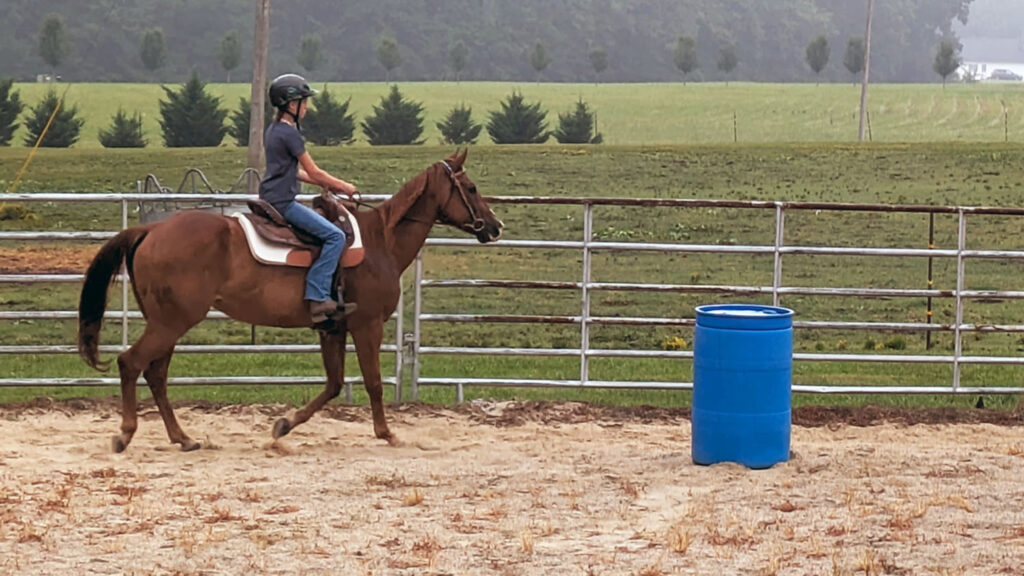
NC State Extension 4-H agents and volunteers introduce youth to the joys of horse riding.
“We have almost 20 different activities that kids can be involved with,” Cross said. “We have specific project goals and objectives for the horse program, which center around respecting and learning about the horse and proper welfare and management.”
Related: 4-H helps instill a lifelong love of horses.
The strength and quality of the program was seen in early November. North Carolina 4-H’ers won all four team contests at the Eastern National 4-H Horse Roundup in Louisville, Kentucky, becoming the first state to finish first in Horse Bowl (knowledge of horses), Communications, Horse Judging and Hippology (a combination of the other three) in the same year.
Horse ownership is not necessary to participate. Typically, volunteers working under the leadership of an Extension county 4-H agent supply horses and give lessons.
“We have a huge legacy of volunteers in this state,” Cross said. “We have a tremendous percentage of adult volunteer leaders who were 4-H horse program members when they were a youth.”
Many programs focus not on riding a horse, but on evaluating it. Youth learn how to judge different horse breeds and riding styles, including western, hunt seat, saddle seat, and non-trotting.
Extension also offers a couple of classes through the equine husbandry program for adults, most of whom want to be certified or recertified to judge horse shows.
“We have an educational clinic in October every year,” Cross said. “We bring in experts in all four different judging areas to teach. In November we have a judges’ certification clinic. We’ve had people from Arizona, Florida, New York, from all over the country come to that. They have to recertify every three years, so it’s a combination of recertifying judges and first-time judges. We also have some people who want to learn more about showing because they are an exhibitor.”
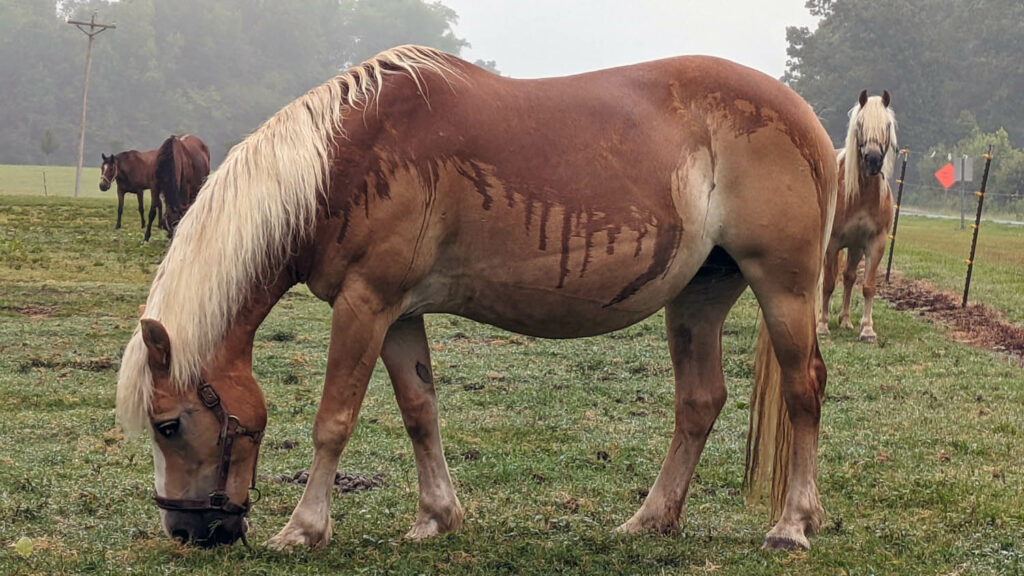
North Carolina is home to many breeds of horses.
The judges are needed because of the numerous horse shows in North Carolina.
“Probably every single weekend in almost every single county of North Carolina there’s an open horse show going on somewhere,” Cross said.
Whether they are used for showing, trail riding or competing in barrel racing or other sports, whether they are quarter horses, saddlebreds, Friesians, Arabians, Percherons, Appaloosas, paints or palominos, domesticated horses in North Carolina represent an investment — they are considered livestock in the state — and require a high level of care that includes food, shelter and veterinary attention.
“They’re tough animals and they’re pretty resilient to a lot of the things that we do, but there’s definitely some management things that you’ve got to consider,” Siciliano said.
Extension has resources to help horse owners with every aspect of their care.
“We are the connectors and the networkers,” Mobley said. “We make farm visits if someone needs help with barn layout, where to put fences, with soil layout, the types of soil for forage. We can provide a list of area veterinarians, and lists of farriers and feed dealers.”
Extending Expert Knowledge
Forage is perhaps the most important element in successful equine management. Just about everyone has had the experience of driving by a field and seeing horses with their heads down, chomping at the grass. That is the animals’ natural habitat.
“They’re designed to eat small, frequent meals,” Siciliano said. “You can’t just dump animals out on a pasture and leave them unmanaged. If you do, you run the risk of overgrazing or just not utilizing the resource.”
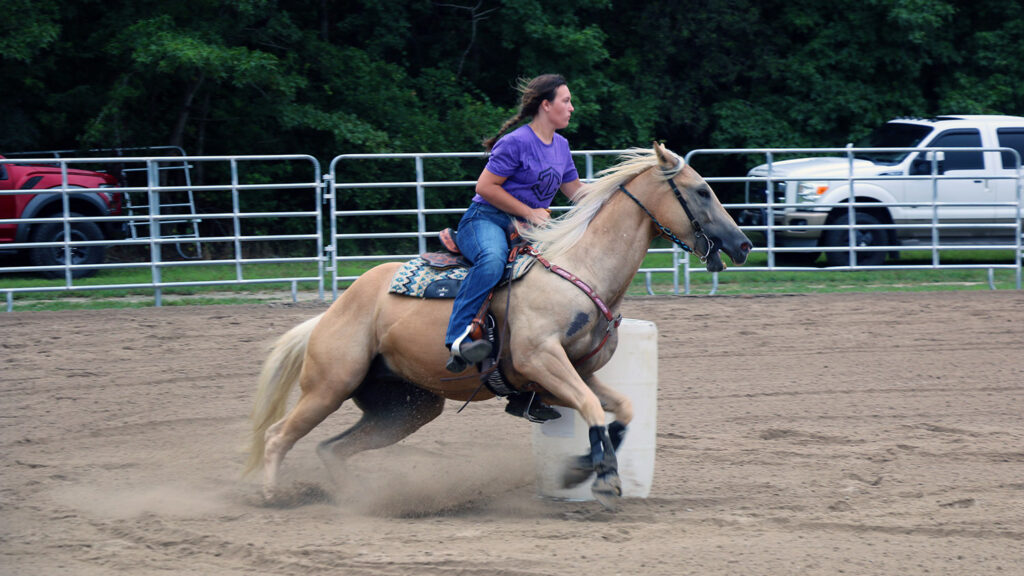
A barrel racing exhibition was part of the 2023 Franklin County horse farm tour.
Extension has grass and weed and pasture experts who provide information on forage, on warm season and cool season grasses that are best suited to the climate, on perennials and annuals. Agents can test for toxins that can adversely affect mares.
Greg Hoit, who has four horses on 6.5 acres on Hwy. 98 in eastern Wake County, has often received advice from Extension’s Johnston County livestock agent, Dan Wells.
“I had some new weeds coming in and my herbicide wasn’t handling it,” he said. “I emailed pictures and Dan said the product you’re using won’t work. It has been like that over the years. I’ve had problems and I’ve reached out.”
Horse owners can also learn pasture management through the Amazing Grazing program, led by Johnny Rogers, Extension associate in animal science.
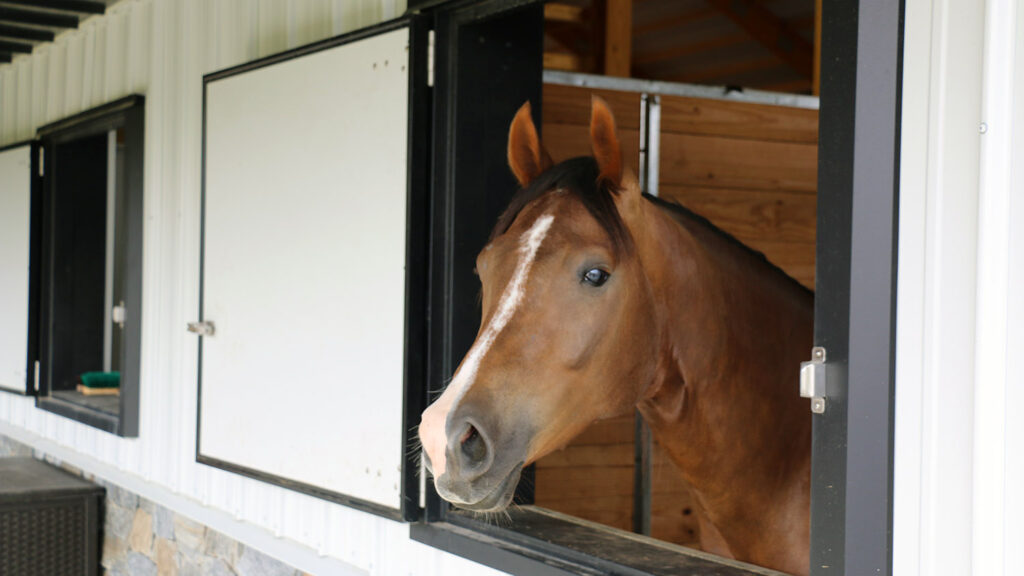
NC State Extension organizes events like horse farm tours so owners can connect and learn from each other.
Extension connects horse owners to important information through events like county horse farm tours. Mobley organized the first one in Franklin County 28 years ago as a means to showcase the local industry and allow people to learn from each other.
“People are curious. They want to see what their neighbors are doing and what this barn is doing,” Mobley said. “This is a way for them to go out and see and share knowledge.”
Participants on the 2023 tour saw a cattle barn converted into a horse boarding facility, an innovative barn attached to a house, and a farm that offers lessons, trail riding and boarding. They learned about the local hay business, pasture establishment and management, and trail riding in North Carolina. They heard from a veterinarian, received an overview of United States Department of Agriculture programs that benefit horse owners, and saw a barrel racing demonstration.
“We like to tour other farms to gain ideas about what other people offer in terms of their facilities and for their horses, and how our farm compares,” said 2023 tour participant Kayla Jones, who operates LT Stables, a boarding facility for retired horses in Zebulon that was a stop on the tour a couple of years ago. “We gain insight and get ideas on how we can make improvements. You also make connections so when you’re driving around Franklin County you know that person on that farm and they know where your farm is. Just being able to talk to other people and get their experience as farm owners really helps.”
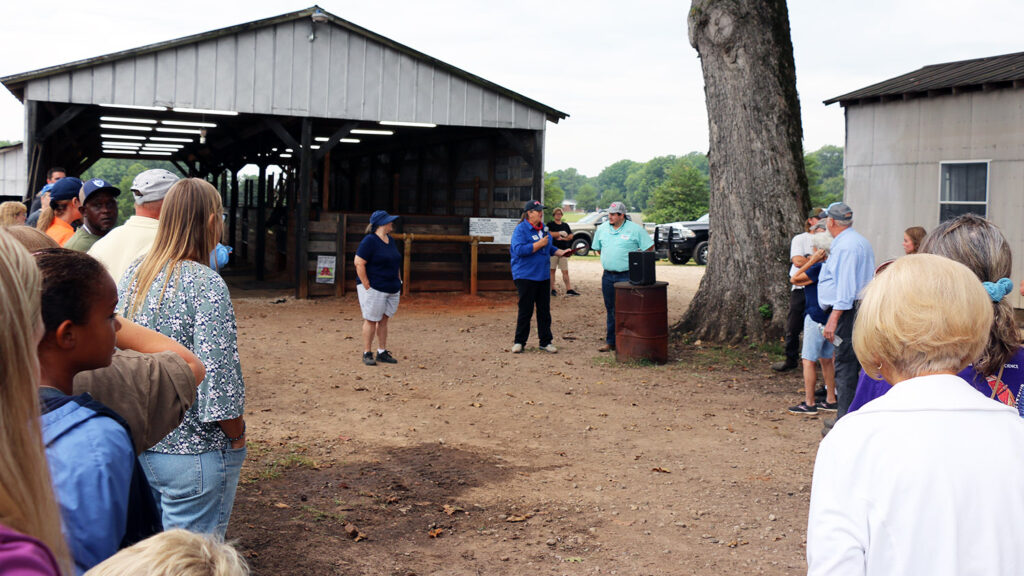
Martha Mobley, agriculture agent and the NC State Extension Franklin County center, speaks to horse owners and lovers who attended the 2023 horse farm tour in her county.
Brittany Barnes, who attends most years, uses the tour to gather information for her future goals.
“I eventually want to get my own land, have my own horses, and have my own barn,” she said. “I’m always looking for ideas. A lot of these smaller farms are working on a budget, which is what I’m going to be doing. It’s just learning and educating myself so that I can plan for when I get my property.”
Her mother, Brenda Wind, is a 4-H program assistant who helps run the youth horse program in Nash County. She has attended the Franklin County horse farm tour for many years, and thought her county should start one. She and Extension livestock agent Jennifer Coltrain participated in the ‘23 tour to garner ideas for their own.
“I have always come on Martha’s tours and I thought we need this. We’ve got an audience if we put it together,” Wind said. “I told Jennifer, ‘Come to Martha’s with me and then we’ll plan it for the following year.’”
The horse tour on the “hottest day of the year” is the most attended event of the year but, as in other counties, Mobley’s programs run year-round.
“We also have winter educational programs,” Mobley said. “We have three sessions in the evenings in January, February and March.”
She has an advisory committee to brainstorm topics, which typically include equine nutrition, forage and pasture management, and veterinary issues. Past sessions have included saddle fitting, trail riding, and endurance riding. And, of course, the EIA clinic on the “coldest day of the year.”
“Horses are here to stay, and I’m glad that I can help the horse owner and the horse community,” Mobley said. “Extension is key. We’re on the ground. We’re the ones that know in the individual counties what’s going on.”

